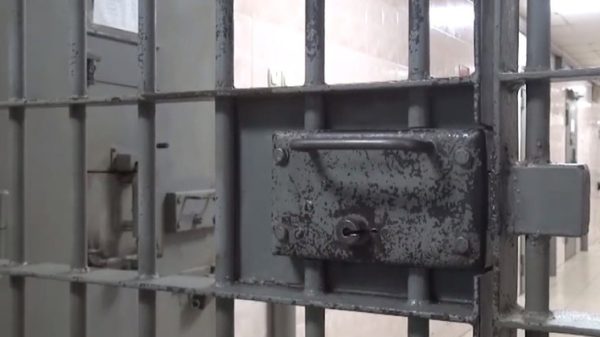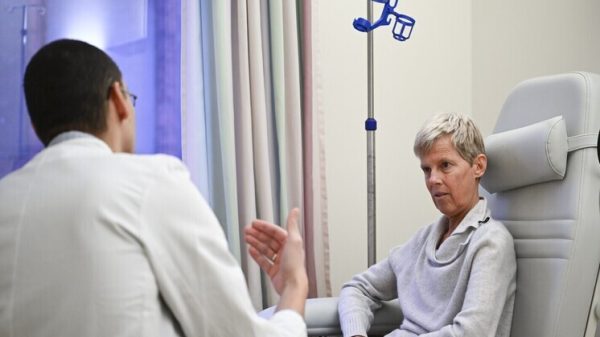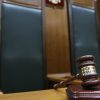
Leading immigration lawyers have told the Guardian that increasingly hostile rhetoric from the home secretary is putting them at risk of being attacked as well as undermining the legal system.
On Sunday home secretary Priti Patel used a speech at the Conservative party conference to criticise lawyers who defend migrants, linking them directly with traffickers who help asylum-seekers to cross borders.
Patel said: “No doubt those who are well-rehearsed in how to play and profit from the broken system will lecture us on their grand theories about human rights. Those defending the broken system – the traffickers, the do-gooders, the lefty lawyers, the Labour party – they are defending the indefensible.”
The Law Society has written to the Home Office asking them to change the language they are using. President Simon Davis said: “Slinging insults at lawyers risks leading not just to verbal abuse but to lawyers being physically attacked for doing their job … [and] it undermines a legal system which has evolved over many centuries, which helps ensure that power is not abused.”
Lawyers who spoke to the Guardian described how increasingly hostile rhetoric from the government was making them feel unsafe for the first time in their careers.
One, a human rights barrister who didn’t want to be named, said: “I’m worried for my safety, I’ve not been before; other lawyers have told me they are worried too.”
Stephanie Harrison QC specialises in challenging the detention of vulnerable migrants, including people with mental health problems and trafficking and torture survivors.
She said the “deliberate” decision of the home secretary and the government to “turn on” lawyers was a tactic used by authoritarian states.
Priti Patel accused of ‘shameful’ bid to deport girl at risk of FGM
Read more
“Demonising lawyers who represent asylum-seekers in the current climate gives rise to a risk of lawyers themselves being targeted and attacked. Home secretaries have criticised lawyers before but this is a dangerous step further: associating lawyers with abuse of the system.
“It’s happening in a climate of extreme xenophobia. Targeting human rights lawyers is what you see in patterns of abusive behaviour by states around the world. When these states move to attacking those defending human rights that’s a really major development … undermining the legitimacy of the legal system and the role of lawyers.”
She said the case of Jo Cox should inform Home Office practice, adding: “Four years ago, an MP was murdered because she was closely associated with supporting refugees and migrants. Any home secretary who consciously decides to use such inflammatory language must recognise such risks.”
A Home Office spokesperson said: “Lawyers play an important role in upholding the law and ensuring people have access to justice, and we are absolutely clear that any form of violence against them is utterly unacceptable.
“We will continue to return those who have been through the legal system, had their application for asylum refused and have no legal right to remain in the UK, and look forward to working with the legal sector to reform our immigration and asylum system”
In August the Home Office was criticised after a video posted by the department used the phrase “activist lawyers”. The most senior civil servant at the Home Office agreed afterwards that officials should not have used the phrase.
Toufique Hossaini is director of public law at Duncan Lewis Solicitors. He has recently been involved in attempts to stop charter flights leaving the UK with migrants who recently arrived in the country after crossing the Channel. This has made the firm the subject of critical tabloid reporting, including a Daily Mail article that said Duncan Lewis were “coaching” asylum-seekers to say they had been trafficked. A following piece highlighted that the firm uses public money in the form of legal aid to provide its services.
Speaking to the Guardian, Hossaini said: “This relentless attack on lawyers who are simply trying their best to represent clients properly and responsibly, in difficult circumstances, is both callous and dangerous. The home secretary knows this, but chooses to press ahead. Upholding the rule of law isn’t activism or ‘lefty lawyers’ frustrating government. John Locke, the English philosopher, said: ‘wherever law ends, tyranny begins’. This is where we are heading.”
One of the main criticisms of immigration lawyers centres on the claim that in order to make money from legal aid they stand in the way of lawful attempts to remove migrants who should not be here.
Lawyers said the reality is very different, pointing out that legal aid pays very little, often leaving solicitors working for free. Research shows that it is often difficult for detained migrants to access a lawyer.
David Pountney of the Manchester Immigration Aid Unit said: “The legal aid provision for people in immigration detention is really bad. It’s clinics, they are oversubscribed and many people don’t get to see a lawyer. A lot of lawyers don’t see this sort of legal aid work as financially viable.”
If lawyers are undermined, Harrison warned, there would be extreme consequences, not just for lawyers but for human rights. She pointed to the appearance of new detention centres as cause of concern.
“We have new forms of detention, created overnight in areas of the country where there is no legal support nearby. And where you end up if people don’t have legal access early on is with Windrush. If they can remove British people who have lived here their whole life, it shows that people need to stand up and recognise that lawyers representing disadvantaged groups are doing vital work. You never know when you will need a lawyer.”






















































Свежие комментарии